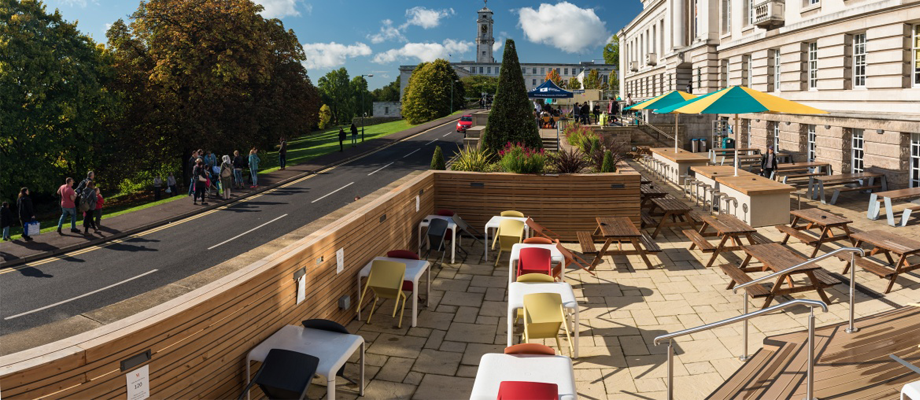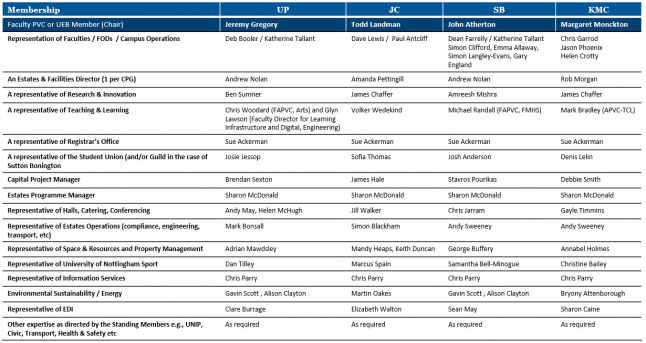
Campus planning groups
May 7th, 2021
Our campuses are hugely important to the attraction and recruitment of the very best staff and students and they’re known for their green spaces, hidden corners, diversity of landscape, planting and architecture and are home to over 4000 students and staff.
We are fortunate to have these fantastic resources and, as we plan for the future needs of our university, we know, through consultation on the University Strategy, that maintaining high quality, sustainable campuses are incredibly important to us all. For these reasons, the Estates & Facilities directorate have created the University Estate Development Framework (EDF) to ensure the future needs of the university are understood and planned for.
Over the past two years we have been building a framework for our future estate that will meet the needs of the university. Many of you reading this will have directly, and indirectly, input to this process already. If you provided feedback to the University Strategy green paper in 2018/19 or have come to one of our EDF consultation events in 2020 your thoughts, ideas and opinions will all have been incorporated into the EDF when it was published in June 2020.
Its adoption by University Council in June 2020 came six months after the publication of the University Strategy and set out 8 guiding principles to build on the characteristics of our teaching and research campuses and to achieve three main outcomes: to be sustainable, connected and adaptable.
Since the EDF was published, we’ve been working on detailed and integrated plans for each of our four campuses in the UK. This is no small task – it encompasses almost every element of our campuses – over 600,000m2 of floor space across over 400 buildings – and includes teaching spaces, research facilities, libraries, sport, our farm, theatres, shops, halls of residence, transport, ecology and environment.
When the EDF was adopted we committed to 8 Guiding Principles against which all future development of the university campuses will be judged against:
- Digitally enabled
- Innovative approach
- Sustainable, healthy and promotes well-being and EDI for staff, students and visitors
- Cost effective and financially achievable
- Continuously improving student and staff experience
- Maintaining a campus to be proud of
- Flexible and adaptable to future requirements for the University’s core business of teaching and research
- Welcoming and accessible to all
Alongside the 8 guiding principles we established 11 Themes which are getting special attention as we develop our campus plans:
- Size, Shape and Space
- Well-being and EDI – people
- Teaching & learning Space
- Environment, Ecology and Sustainability
- Research & Knowledge Exchange
- Branding & marketing
- Transport, Accessibility and Way Finding
- Digital Interface
- Amenities – Accommodation, Catering, Commercialisation
- Heritage, Civic presence & Engagement
- Sport and Recreation
In January this year we began to translate the priorities and themes of the EDF into more detailed campus plans to deliver a balance of prioritised investments across all campuses. Engagement with the wider university community is one of the defining characteristics of this programme and is central to the process for ensuring that the guiding principles of the EDF remain uppermost.
Each UK Campus has its own Campus Planning Group Chaired by a Member of the University Executive Board. Professor John Atherton is leading the development of the Sutton Bonington Campus, Professor Todd Landman is heading up the Jubilee Campus plan, whilst Margaret Monckton Chairs the King’s Meadow planning group and Professor Jeremy Gregory is overseeing the plans for University Park and the portfolio associated with the Medical School, Derby Royal and City Hospitals. We have also put in place an EDF Programme Board to provide strategic oversight and manage inter-dependencies between the four groups. That programme board reports in directly to the Estates and Infrastructure Committee.
The 12-month programme comprises 6 Chapters with the following descriptive titles; Conceive, Craft, Consolidate, Create, Confirm, Complete. Since January we’ve been actively listening to the needs of our key stakeholders and, as we go into mid-May, we’re beginning to consolidate our thinking from chapters 1 and 2 before starting the process of shaping each plan in more detail. To help those 60+ representatives, we have put in place a series of presentations with expert speakers for every individual EDF Theme.
By early 2022 we aim to have a strategic Campus Plan for each of the 4 UK campuses covering short (0-5 years), medium (5-10years) and longer-term (10-20 years) timescales. The plans will outline the future look and feel, with broad timescales for delivery, subject to University financial planning and governance procedures. Of course, it will include refurbishments to existing buildings and infrastructure, enhancements to our external spaces and new buildings too. The outputs from this planning process will be made available to the wider university community and will be integrated with the university’s strategic delivery plans to ensure the estate is able to support the needs of our community.
We’ve been really pleased with the level of engagement from academic and professional services staff together with officers of the Students Union/Guild across the university in all 4 Campus Planning Groups with some creative and exciting proposals coming forward. These are now starting to be prioritised in alignment with the University Strategy and the Themes of the EDF. We’ll be sharing our progress with you in more blogs like these in the coming months.
How can you get involved?
If you have a great idea for our campuses we’d encourage you to either share your idea via this form which you can submit directly or talk to one of the campus planning group representatives if you have ideas you’d like to share. We have representatives for a wide range of areas across each of the 4 campuses and we have a dedicated estates project manager for each of them too. You can contact them directly (membership of the groups is set out below) or you can contact me, direct: andrew.nolan@nottingham.ac.uk .
Brendan Sexton – University Park and Hospital sites – brendan.sexton@nottingham.ac.uk
James Hale – Jubilee – james.hale@nottingham.ac.uk
Stavros Pourikas – Sutton Bonington – stavros.pourikas@nottingham.ac.uk
Debbie Smith – King’s Meadow – debbie.smith@nottingham.ac.uk
Membership of the Campus Planning Groups is shown in the table below (click to expand).
Leave a Reply
Other

Major road resurfacing works: Monday 22 – Friday 26 April
A number of diversion routes will be in place from Monday 22 – Friday 26 April […]

Call for staff helpers – Undergraduate open days
The university is looking for staff volunteers to help at university open days on Friday 28 […]


